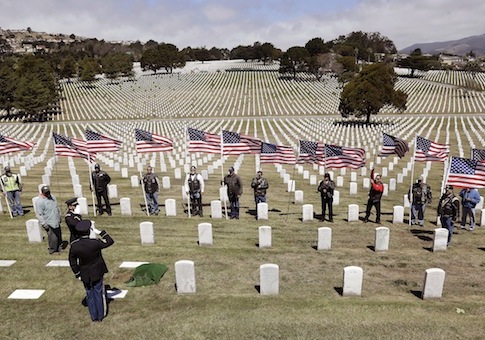Ray and Harry didn’t know each other in Vietnam, but you wouldn’t know that from the way they talk.
"There’s nobody like this guy," Harry tells me with a grin on his face. "Nobody else could bring thousands of people across America to Washington, all for our veterans."
I met Harry Dill and Ray Manzo, veterans of the 7th Marine Engineer Support Battalion, by chance at a bar in Arlington, Va. They were in town for a reunion, but it wasn’t just to trade war stories or catch up with long-lost friends. For them, it was a chance to help people.
Since 1987, Ray has organized the annual meeting of Rolling Thunder, a motorcycle ride through Washington, D.C., that at its peak saw more than a half-million bikers burn rubber to commemorate soldiers who never returned home. What started as an event has evolved into a community, an opportunity to forge new bonds and preserve old ones.
Out of everything Ray did in Vietnam—the man won a Bronze Star for his valor in battle—he says nothing compares to the mission of Rolling Thunder. He tells me it’s God’s purpose for him.
"There was one firefight where everyone around me was wounded or killed," he said. "In that moment, I truly think God wrapped his robes around me and said, 'Ray, be safe. I need you for something else.'"
And Ray did something else. After coming back from Vietnam, the Philadelphia native found himself estranged from his fellow countrymen. He recalls heckling from college students and protesters for serving in an unpopular war and accusations of being a war criminal from people who did not know anything about him. All he could think about were his brothers-in-arms who remained over there. It ate at him every day.
"We had a saying in the Marines, 'No man gets left behind,'" he said. "I believed in that. I still do."
At first Ray wrote letters to newspapers across the country, pleading his case for the American people to remember the troops we left behind. Through the early 1970s, more than 2,000 U.S. soldiers remained unaccounted for. Most newspapers met his letters with nothing more than a polite decline, wishing him well. That’s when he decided he had to do more.
Ray’s idea began with only a few thousand riders from biker clubs nationwide in 1987. The bikes would drive through the nation's capital in an attempt to send a message to lawmakers: Bring our boys home. What started small grew bigger year after year. Eventually it wasn’t just about Vietnam either: Thousands of veterans and their families would come to Washington to raise awareness for prisoners of war from every major American conflict from Korea to Afghanistan.
"It’s about paying respect to those who made the ultimate sacrifice and protected our freedom," Ray said. "I’m just an average Joe. It’s not about me, the money, or anything else. It’s about those men."
A few beers later, Ray and Harry got to talking with me about their time in Vietnam, their families, and everything in between. Harry, a publisher in Charlotte, N.C., came up for the weekend to see Ray and his friends. He tells me he never talked about the war with family or friends. It’s something he’ll only discuss with fellow Marines.
After being isolated for a year by the coronavirus (Rolling Thunder was canceled last year), both men’s faces glowed. In a bar where everyone seemed under 30 and the latest hip-hop track was playing, the two veterans were unbothered, just happy to be back in each other’s company. Our corner booth was a time machine to a different era.
As the two talked about their lives and their time in Vietnam, I couldn’t help but notice a sense of sunny optimism in their voices. They talked with concern, even indignation, about the rise of China, the disarray of American education, and the state of Congress, but both still think America’s best days are ahead. The good judgment of the American people, they told me, hasn’t changed and won’t change.
"I believe that most people want the lives their parents had, or something like it," Harry said. "The genius of the Constitution lets that happen."
I was born almost 30 years after the fall of Saigon. The first American boots hit the ground in Vietnam when military advisers arrived in the country 60 years ago. Every year, there are more Americans born who will never understand what the war was like, nor appreciate it in full. I grew up on stories of the war from my grandfather, but there will soon be a generation that has no living connection to the conflict. For some, it may end up just another glossed-over page in a middle school history textbook.
That won’t happen, Harry and Ray said, chuckling at my incredulity. Americans are proud people. We are proud of our military, our history, and our people. Those who don’t want to forget never will—even if they themselves can’t remember.
As we got up and shook hands—the two were off to a hotel to see more Marine friends—Ray looked moved. With a twinkle of conviction in his deep blue eyes, he said God brought us together that day. I couldn’t help but agree. I certainly wouldn’t forget them or their service, even if it’s not something I can remember myself. Their memory will persist through the bikes that return to Washington every year, through the star-spangled flag that's raised high. And somewhere even decades from now, Harry and Ray will be sitting at a bar, laughing.
